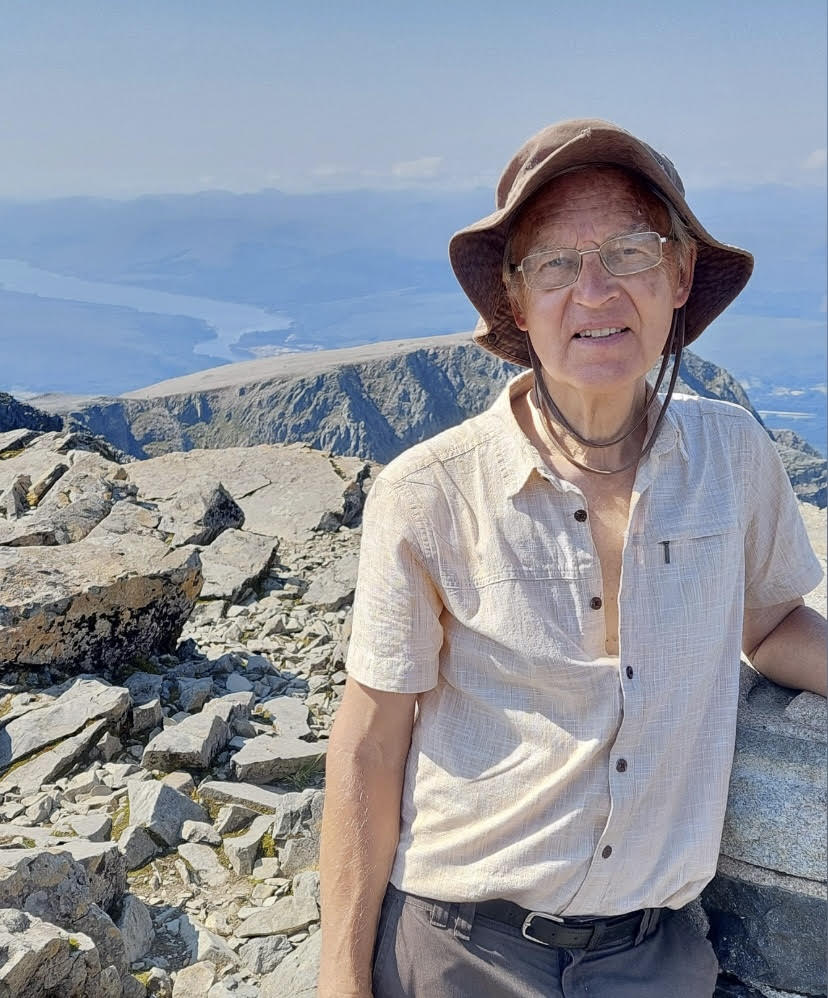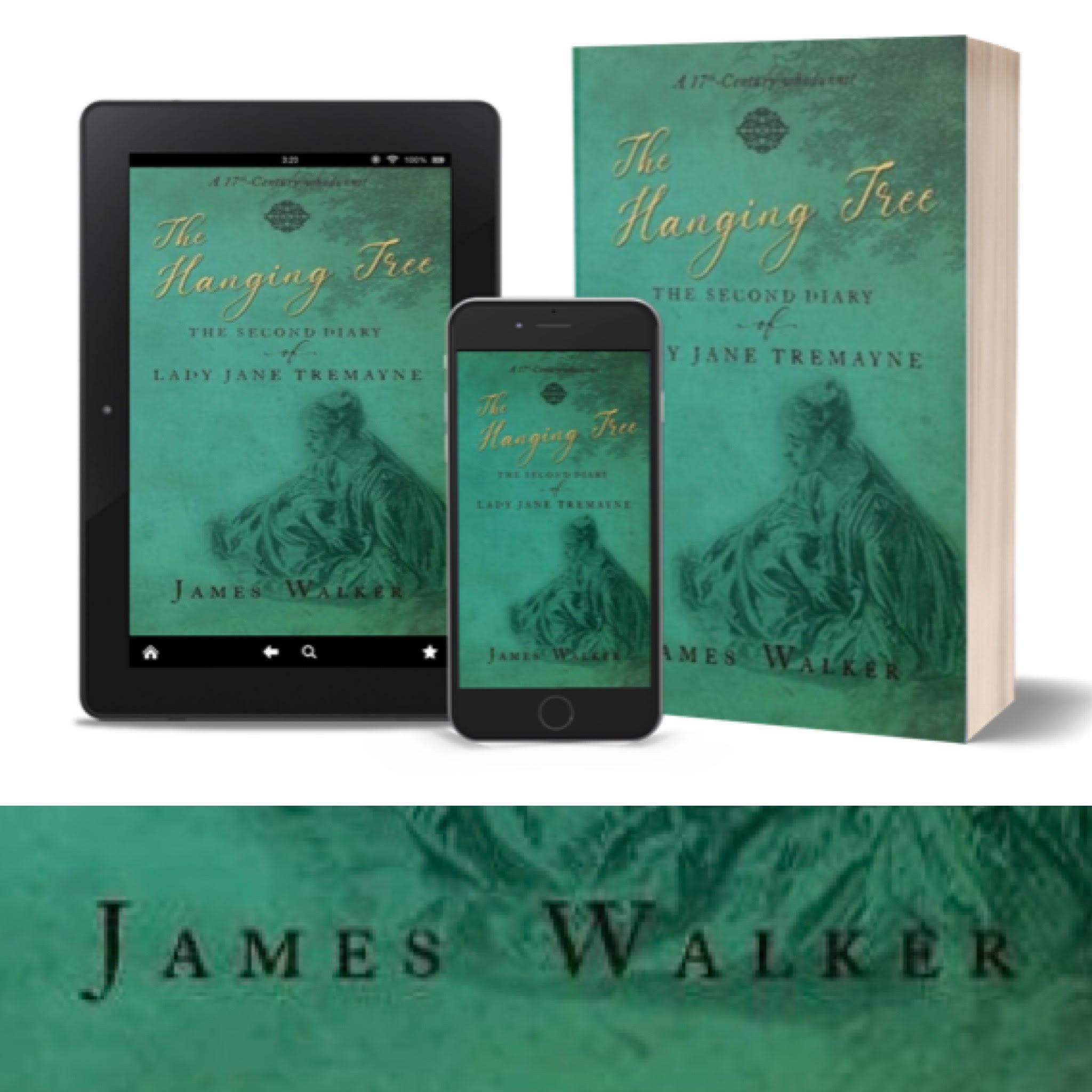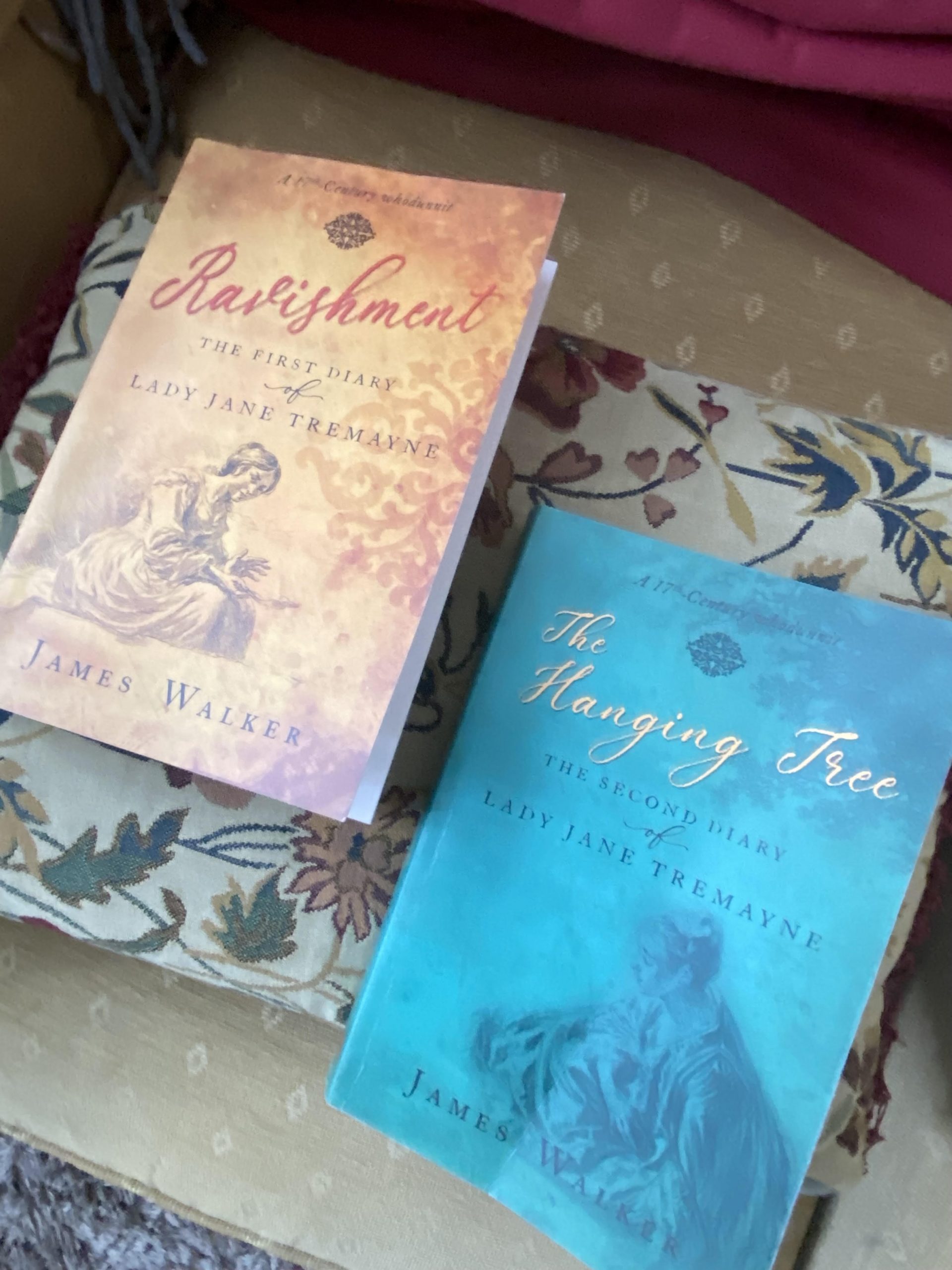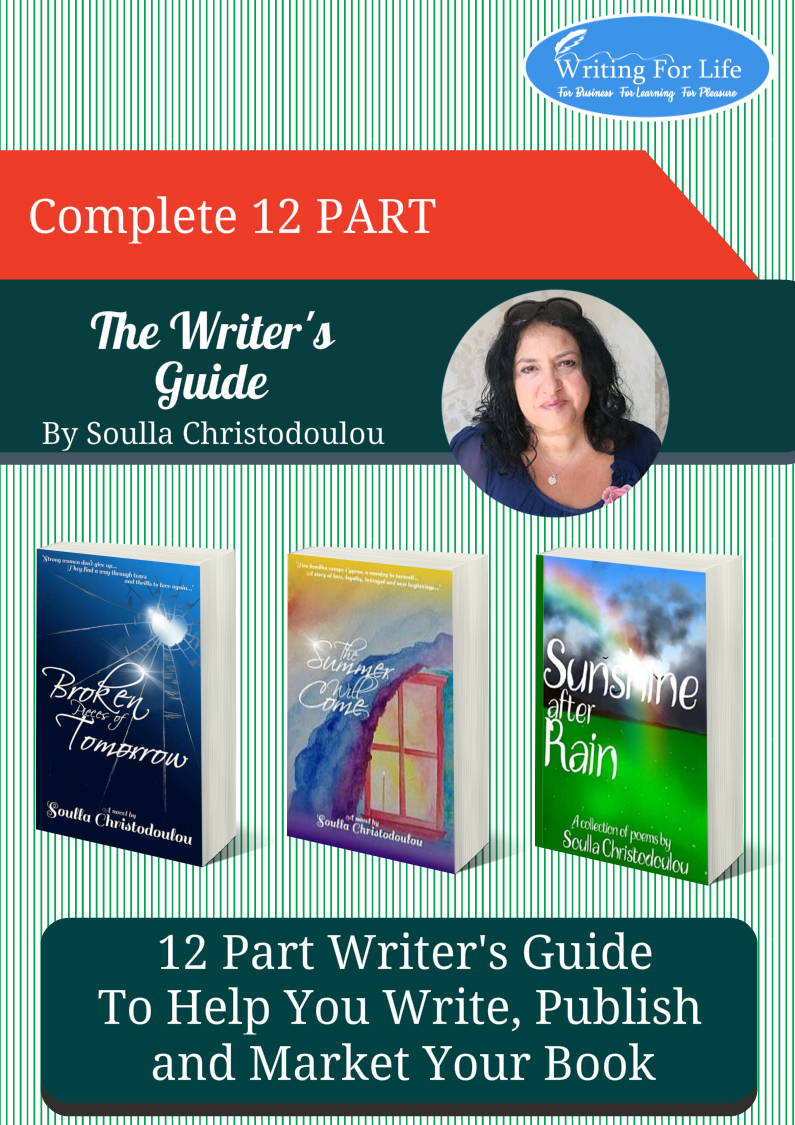Hello and welcome to A Cup of Conversation where I am joined by author James Walker who talks about the inspiration behind his writing, his interest in the 17th Century and who he would most like to meet from that period.
I’m grateful to have received copies of two of James’ books – the first two in his whodunnit series, Ravishment and The Hanging Tree – in advance of this interview.
I have read both and admittedly I still find myself drawn to his beautiful writing and the scenes laid out so clearly on the pages. Both books had me engrossed for hours at a time and I’m missing the adventures of Jane and Olivia.


1. When did you start writing creatively?
I’m just 71 so a long time ago but what I wrote in my late twenties and early thirties wasn’t of anything like a publishable standard. Then, while my children were growing up I wrote children’s short stories and a fair amount of poetry.
Finally, more than fifteen years ago now, I began to write an historical novel, Ellen’s Gold, set in the Napoleonic era, of which I’m still proud as it was a labour of love and went through quite a few drafts and revisions. It was also a steep learning curve in terms of seeking a decent writing style and I needed a lot of advice.
2. How did you first become interested in writing books set in the 17th century?
I’ve had an interest in 17th century since I was a child. It’s always excited my imagination far more than the more popular Tudor era.
I can appreciate the fascination of the latter, but the era between 1640 and 1660 was just as dramatic, and as a consequence of the civil war, the King’s execution, and the Commonwealth under Oliver Cromwell that succeeded him, the established order was shaken to its very foundations. It was not just a civil war but a revolution.
3. In what way has your career as a lawyer influenced the themes of your books?
I would say not at all, though I would add that when it came to creating a character like Lady Jane, how she goes about her investigations, and the advice she often seeks from her lawyer, Francis Overbury, a legal background was certainly very helpful.
4. Who is your favourite character in Ravishment, the First Diary of Lady Jane Tremayne and why will readers like him/her?
These are first person novels with the central character very much being Lady Jane, who’s widowhood gives her a degree of independence, which she would not otherwise have been able to enjoy in 17th century society. She’s very determined, with a strong sense of justice, by her own admission often too impulsive, and thanks to the independence she enjoys, daring to tread where women were not expected to.
Of course, she also acts in partnership with her more cautious friend, the spinster Lady Olivia Courtney and I hope the interaction between them has its appeal.
5. Please share an excerpt from your latest novel, The Hanging Tree, the Second diary of Lady Jane Tremayne, and tell us what you like about it.
It was also obvious that we were heading inland, and I surmised in a south easterly direction, although it was hard to be certain as the sky was blanketed with rain clouds. Our progress was inevitably slow, but at least after a while the rain began to abate, and eventually the sun broke through the clouds to confirm the direction in which we were heading. Not long afterwards we came in sight of what appeared to be a town, which a signpost told me was called Saint-Renan.
By now it was well after midday and Nancy, for one, was beginning to complain of thirst. Once we entered the town, its main well was soon located, from which water could be drawn, whilst a bakers was able to provide a quantity of fresh bread. It was a Wednesday, the town was quiet with few passersby, and the three of us were not even allowed to leave the cart. Nor did we linger long and were soon on our way again, continuing in the same south easterly direction for less than an hour before we once again came within sight of the sea.
We were approaching what appeared to be a broad estuary or inlet and I then caught a glimpse of some distant habitation on the coast, perhaps a fishing village or even something larger; it was hard to tell. Nancy was beginning to complain with increasing desperation that she needed to relieve herself and begged that she might be allowed to do so before she was forced to soil herself.
At first her appeals were stubbornly ignored. Then she was told to ‘shut up’ as we would be at our destination within half an hour, but still she whined on until we entered a wooded area whereupon the cart was brought to a halt and she was allowed to get out.
‘Might I also be allowed to relieve myself?’ I enquired
‘Alright,’ the stubbornly anonymous, dark-skinned man told me. ‘Mind you, try to escape and I’ll make you suffer for it. Is that understood?’ I nodded, and then eased myself off the back of the cart.
My feet had barely touched the ground when I heard a scream and looking around saw that one of the seamen was in the act of trying to rape Nancy.
‘In the name of Allah, keep your dick inside your trousers,’ the dark-skinned man swore. He then strode up to the man in order to pull him off Nancy before cuffing him over the head as well as kicking him with his boot.
I threw my arms around Nancy to comfort her, and within a few minutes we were on our way again, the incident serving as a salutary warning to all three us of the level of risk we faced of being assaulted and raped. For my part, I could also see the irony in the dark-skinned man acting as our protector, even while threatening to make me suffer if I made the least attempt to escape.
More than ever, though, I was still determined to take that risk, and was increasingly convinced that it would have to be sooner rather than later. Apart from whether I should seek to do this in consort with Mary and Nancy, the main question on my mind was whether I should seek to make an appeal for help on behalf of the three of us in French to some passing strangers, who might realistically be able to come to our aid. I had contemplated such a strategy before, but the right moment had never quite presented itself, or, even if it had, I had still hesitated for too long. I knew that I had to throw off any apprehension and act boldly, but that was always easier said than done.
Within another quarter of an hour we came in sight of much more than a mere coastal town. A sign informed us that its name was Brest, while I could see a curtain wall, which reminded me of Exeter. Furthermore, from the number of masts I could make out it was clearly a port of some importance.
Entering such a place would surely present me with the opportunity I was looking for. Yet, to my growing frustration, our captors took no risks. First, we halted before entering the city and waited, while the dark-skinned man, along with one of his cronies, went on ahead. An hour then passed before they reappeared and when they did so they produced a linen sheet.
‘We’re going to keep you under cover until we reach our destination,’ the dark-skinned man said.
‘You’re to lie down.’
I looked at him defiantly. ‘No, I won’t.’
‘I said lie down or I’ll take my fists to you!’
Very reluctantly I complied with his demand as did Mary and Nancy. To be forced to lie under the sheet was yet another humiliating experience and a thoroughly unpleasant one, too, as we had to lie face down with our feet facing the rear end of the cart. Worse, to prevent us from moving, three seamen placed their feet on top of us.
‘I can’t breath!’ Nancy complained.
‘Course you can!’
‘I can’t, I can’t!’
One of the seamen then produced a knife and used it to tear the sheet a little. ‘That’ll give you enough air. Now be quiet or else!’
The cart then moved forward at the same walking pace as before and I could only gather where we were from the sounds I could hear as well as certain smells I could detect, some far more pleasant than others. It was when I heard the sound of an English voice, seemingly quite young and cheerful, and with an educated accent, that I knew I just had to seize the moment and began to scream.
‘Help me, please help me! I’m a…’
At that moment I felt an awful blow to the back of my head and screeched out in pain before almost passing out.
‘What’s going on here?’ It was that same educated English voice, sounding concerned.
‘Mind your own business!’ The dark-skinned man growled back.
‘Who are you holding under that sheet?’
‘Fuck off, will you, unless you want a fight.’
‘I’m Lady Jane Tremayne, I’m being held against…’
Once again I was struck on the back of the head and once again screamed out in pain. I could also hear the crack of the whip and the cart beginning to move along more quickly.
‘You won’t get away with this,’ the same English voice cried out.
I like to think this passage gives a good flavour of the fact that this is as much an adventure novel as it is a whodunnit. Jane and her maid, Mary, have been kidnapped and are in danger of being sold into slavery until a shipwreck gives them hope of being able to escape. That hope is, though, still a slim one, until, by sheer good fortune, an unknown Englishman appears, but will
that of itself be enough to save them?
6. What has your experience of writing the book taught you about yourself and your writing?
I find that a quite a hard question to answer.
I know I couldn’t have written either Ravishment or The Hanging Tree without first creating a plot outline that I thought was credible.
Some writers may not see the need for this but certainly with whodunnits I think it’s really essential. I pretty much understood that before I started to write these books and completing them has just emphasised to me that having a general idea about characterisation and setting and then hoping everything will come together as you write the book, is unlikely to work very well, if at all.
As for the first part of the question, these are not literary novels seeking to explore the deeper realities of the human condition and I didn’t write them with any great sense of introspection.
I’m essentially trying to be entertaining and really just had the idea that a strong female historical character ought to have a lot of appeal in circumstances where for much of human history women have for the most part been very much the underdogs and in some societies still are. The
exceptions have also needed to be quite special human beings and it’s hard to bring any to mind apart from say Joan of Arc who weren’t from privileged backgrounds. Even then, in order to be fortunate enough to inherit wealth, and with it independence and even power in their own right,
they basically needed men to die without leaving male heirs. Bess of Hardwick, who lived in the 16th century, is a good example amongst the English aristocracy and Queen Elizabeth the First
the supreme example amongst the nation’s monarchs.
7.Who would you most like to meet from the 17th century and what two things would you ask
them.
There are a lot of interesting contenders here and I’m going to exclude William Shakespeare, who might otherwise have been a first choice as although he lived into the 17th century, he’s seen as being more of a 16th century personality from the Tudor era. For the purposes of this exercise I’ll also stick to people from these islands although talking to people like say Galileo or Rembrandt would be fascinating. Then there are all our Stuart Monarchs, Oliver Cromwell, of course, and Samuel Pepys.
The list goes on, but I’m going to opt for the great metaphysical poet, John Donne, and also for Queen Henrietta Maria, spouse to King Charles the First, although if I was going further afield Queen Christina of Sweden (once portrayed on film by Greta Garbo) would certainly be worthy of consideration.
My questions to John Donne would be firstly to ask him his opinion of the characters of King James 1 and King Charles 1, both of whom he knew quite well, and secondly to elucidate on the ideas behind his great poem No Man is an Island…
My questions for Queen Henrietta Maria would firstly be to ask her what is was like to be married to King Charles the First and secondly whether there is any truth in the possibility that Henry Jermyn, who became Earl of St Albans, was in fact King Charles the Second’s father. A
fluent French speaker, he was certainly very close to the Queen, who was French born, and he and King Charles resembled each other.
8. What most surprised you about the writing community?
I question whether there is any such thing as a writing community to be surprised about. Certainly, to the extent that it exists it’s a very loose and disparate one. Perhaps that’s not too surprising as writing is such a personal and solitary activity.
9. What do you find most frustrating about the writing/publishing industry?
It could be more honest about the realities of publishing. There’s an implicit assumption that publishers/agents are the gatekeepers of professional excellence in writing but I think that’s somewhat questionable.
Literary excellence is a skill to be admired and perhaps an innate gift given to very few. Hopefully, publishers are good at spotting this when they see it, but there are quite a few examples of their failing to do so, or, perhaps more to the point, failing to see what they can in fact expect to make a profit from.
The honest approach would be to just admit that publishers and agents exist first and foremost to try and make a decent profit out of marketing books and in the twenty-first century by far the easiest way of doing that when it comes to
literature is by promoting established writers, of course (the fortunate few, many of whom are outstanding) or celebrities who have decided to write a novel and expect to sell copies on the back of their relative fame.
For everyone else, in what is admittedly a very crowded market with writing never having been easier from a practical perspective, (I remember the days of typewriters and physical encyclopaedias!) it’s a very much tougher game with thousands of perfectly well written novels never getting more than a first glance. I’m not saying that it’s ever been easy in any era but I believe there are now fewer mainstream publishing companies than there were twenty years ago and that doesn’t help either
10. What are you currently reading?
I’ve just finished the brilliant book by Catrine Clay entitled The Good Germans.
It principally follows the lives of six Germans who opposed the Nazis, is brilliantly researched and reads like a novel. I have German ancestry, have written a novel about the Nazi era, Aliza my love, and have a good knowledge of the history of that era.
However, before reading this book I never fully appreciated how widespread the opposition to Hitler actually was in Germany, culminating in the plot to assassinate him in July 1944.
Unfortunately, the Nazis were utterly ruthless in stamping out opposition by means of intimidation, imprisonment and executions.
Further, they had a master of propaganda in Joseph Goebbels. It’s a sad book but I’d make it required reading for teenagers so they can fully appreciate the capacity of any government with a Fascist mentality insidiously make life hell for anyone who disagrees with its agenda, and, with Germany as the prime example, ultimately even bringing their country to total ruin.
Thank you for joining us, James, and I wish you all the best as you promote your newly-released book and all the others that came before! I certainly enjoyed reading Ravishment and The Hanging Tree.
And to my weekly readers, if you would like to link up with James Walker you can do so on his links listed below.
Until next week, Happy Reading, Happy Writing, Happy You.
Big hug, Soulla xxx


